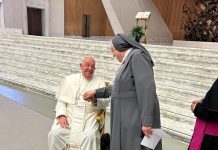Rome (Italy). From 30 November to 12 December 2023, the 28th United Nations Conference of the Parties on Climate Change was held in Dubai, UAE. This is a theme strongly felt by Pope Francis who, in the Apostolic Exhortation Laudate Deum, expresses confidence in the event: “If we have confidence in ability of the human beings to transcend their small interests and to think big, we cannot give up dreaming that COP28 will lead to a decisive acceleration of the energy transition, with effective commitments that can be monitored permanently” (LD 54).
The main objectives of this year’s conference at which there were expected 160 Heads of Government, 70,000 leaders among participants and industry representatives, about 4,000 media representatives: to accelerate the energy transition; to define climate finance; to place nature, people, life, and livelihoods at the heart of climate action; to base all initiatives on full inclusiveness.
In Circular n° 1033, the Superior General of the Institute of the Daughters of Mary Help of Christians, Mother Chiara Cazzuola, quotes the world event saying: “The challenge before us is so great that it requires the contribution of all the States, of the great international organizations. True international and multilateral cooperation is essential.” And she urges the FMA and the Educating Communities to take an active part in these spaces of conversation, consultation, and participation. “Our organizations, associations, networks, universities can be places where a conscious and firm voice can be heard for the complaint and for the proposal”.
Sister Elisa Tonello, FMA missionary of the Province O. L. of Peace (AFM), which in Luwingo, Zambia, carries out a project of agricultural education in the Valponasca Learning Farm involving numerous groups of farmers and families, participated in COP 28, invited by the Future Economy Forum, a global alliance of leaders, organizations, and partners with the aim of paving the way for a new economic system.
Why participate in COP28?
“Because the phase of analysis and perspectives has had its time” – replies Sister Elisa – “It is time to focus on how to multiply positive solutions, so that the small spark turns into a global fire. In this sense, COP 28 is a unique opportunity to better focus on the goals of a sustainable future, in collaboration with government and religious leaders of finance and civil, and many other sectors”.
How did the FMA adhere?
“The Salesian Sisters joined in particular at the Future Economy Forum, to lay the foundations for the economy of the future, so that in a few years there may be a global economic transition, and sustainability can become the key to the future. The work was focused on four major sectors: agricultural production, industrial production, the world of finance and leadership, which is needed for management. They reflected on how to implement a process that leads to innovation and its implementation, focusing on solutions and what leads us to a truly sustainable future, with the aim of innovating to transform.
Solutions are those initiatives that create regenerative value for all stakeholders: environment and society, consumers, entrepreneurs and investors. What has a regenerative value is able to systematically bring a positive impact on nature, with a consequent advantage for the economies of the countries,” explains Sister Elisa.
What struck you most about the experience?
“Being there I immediately realized that there was not a lot of talk about the climate issue and all the related issues, of which we are already aware, and I did not hear words of complaint. ‘Skilling up’ – progress, acquire new skills – and consequently multiply positive experiences – was the watchword of the Forum in which I participated.
Several experiences were presented by companies that aim at sustainable agriculture, improving the conditions of workers, ensuring fair treatment, investing in agroecology, and focusing on food quality. What is striking is the large number of hectares of land removed from desertification and converted to sustainable agriculture, of workers involved, of production aimed at improving the quality of the environment, and the welfare of people, which bode well.
This is why I believe that transforming the economic model in a few years, making ‘bio’ the dominant trend in the food sector is not just a dream, but a process in which the spread of natural agriculture will have its weight and it is worth investing on this as educators”.
What message do you bring?
“I think that COP 28 is a challenge for our Institute, to become more and more aware of the potential that we have with the widespread network of our presence and the relationship of trust established with people to transform society and economy through education and the multiplication of positive experiences”.




















